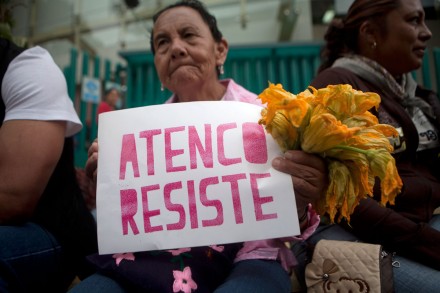
In 2001, Mexico’s federal government joined with the local government of the State of Mexico and “expropriated” the land wherein lay the village of San Salvador Atenco. In order to build a new airport, the State, with little to no consultation, decided to forcibly remove thousands of people, mostly indigenous, from the lands they had inhabited for generations. The people of San Salvador Atenco organized a massive resistance to this plan. In May 2006, the Governor of the State of Mexico Enrique Peña Nieto, sent in the police “to clean up the mess.” Two people were killed and 217 detained, of whom more than 50 women were tortured and sexually violated. Though haunted by the experience, the women refused to become specters. For a decade they have refused every government attempt to silence them, from intimidation to bribes. They have said, every day, we want justice and freedom, and that means we want the truth to be known. This week, the Inter-American Commission on Human Rights decided to pursue the case of “Mariana Selvas Gómez y others”. These are the women of Atenco: Mariana Selvas Gómez, Georgina Edith Rosales Gutiérrez, María Patricia Romero Hernández, Norma Aidé Jiménez Osorio, Claudia Hernández Martínez, Bárbara Italia Méndez Moreno, Ana María Velasco Rodríguez, Yolanda Muñoz Diosdada, Cristina Sánchez Hernández, Patricia Torres Linares and Suhelen Gabriela Cuevas Jaramillo.
Working with the Centro de Derechos Humanos Miguel Agustín Pro Juárez, better known as the Centro Prodh, the women fought, day in and day out, for one thing, “a public reckoning of what happened to them and who ordered it.” During the last decade, they say they have met many other Mexican women, and in particular indigenous Mexican women, who have suffered State-administered sexual torture. For that reason, they joined the campaign, “Breaking the silence. All against sexual torture.”
For ten years, the women of Atenco lived with trauma and memory, watching the men who tortured them walk free and empowered, watching the State do worse and less than nothing, and they refused to accept any of that. When the State tried to threaten and intimidate them, they pushed back. When the State offered them free homes and scholarships, they refused. They said, like the land, like the Earth itself, they were not merchandise, and they were not for sale.
In 2011, Martha Pérez Pineda, of the Peoples Front in Defense of the Land, an organization begun in 2002 in San Salvador Atenco, explained, “Today is one more day of women’s fight for justice and freedom … It was the women who led the fight against the government’s imposition of constructing a new airport on our land. It was we, women, who decided that nothing was going to be constructed there. It was us who decided that those lands were going to keep on being farmlands. We stood firm even when the government tried to subjugate us and to break up the social movement, we, the women said you are not going to subjugate us. We are going out to the streets, in spite of the risk to our lives and our integrity, we are not going to be quiet, we are going to keep on demanding freedom and justice … in Atenco we women say no, we will keep on raising our machete, we will keep on raising our bush of maize that symbolizes life. Those symbols give us a lot of strength … Everything comes from the land, she is so generous. When we walked in our territory during these ten years of fight we see how ourselves in our personal territory as women, have also taken a long journey. In Atenco we are no longer the same women who began the fight. This fight has changed our behavior in front of the male comrades, it has transformed our decisions and our life plans. This fight has helped us to understand that we are not the only women who are living or who lived this violence in 2006, even if violence against women continues.”
That was 2011. Five years later, for the women of Atenco and for the women they stand for, the struggle and the transformation continue.

(Photo Credit 1: Zapateando)